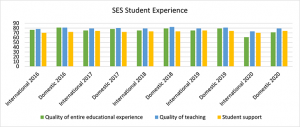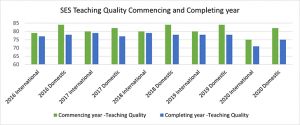by MAHSOOD SHAH
Confronted with falling international student enrolments during the pandemic, Australian higher education providers are now revisiting their strategies on how to, once again, increase enrolments.
As this happens, it is perhaps an opportune time to examine the experiences of international students – and how we can improve them.
National data such as the Student Experience Survey (SES) and Graduate Outcomes Survey (GOS), as well as internal feedback mechanisms are the basis for how institutions gain insights on the experiences of both domestic and international students.
But we can no longer take for granted that changes implemented at institutional level will improve the experience of diverse students. We need to gain better insights on student experience at different levels including course, campus, on-line vs on-campus, undergraduate vs graduate, domestic vs international (including offshore), students from various pathway programmes, and those from different equity backgrounds.
Historically, international students’ experience has been rated higher than domestic students in Australia. However, recent trends suggest that international student experience is lower on one fundamentally important measure – the Quality of Entire Educational Experience, as well as other scales including Quality of Teaching, Skills Development, Student Support, Learner Engagement, and Learning Resources.
In 2020, as COVID-19 pandemic forced institutions to transition to on-line teaching with students studying from home, the decline was most significant. There was a 10 per cent drop in the Quality of Entire Educational Experience item, 6 per cent in Quality of Teaching, and 6 per cent in Learning Resources scales. In the Learner Engagement area, where the sector has been under-performing for many years, we saw a very low rating of only 42 per cent by international and 45 per cent by domestic students. Learner Engagement is significantly low compared to other scales which rate between 75% and 82%. The 2021 data shows drop in international student experience compared to domestic students in Quality of Entire Educational Experience item and most of the scales.
An analysis of the national data also shows that the experience of the commencing year international students is higher than final year. In the Quality of Teaching scale, commencing international student experience rated 75 per cent compared to 71 per cent with final year students in 2020. The poor experience of international students is evident during the pandemic with a decline of 14 per cent for commencing international students between 2019 and 2020. The 2021 data also show that commencing international students experience is higher than final year in undergraduate study, whereas in postgraduate study, final year student experience is higher than commencing year.
As we move into recovery mode, higher education institutions need to focus on providing a high-quality education experience to students. With institutions increasing annual tuition fees, it is critical that price remains as a proxy for quality of the education experience. Our mindset on growth will not improve the quality and reputation of the educational experience in Australia. For many years, our focus has been to grow enrolments, increase revenue, and for some, relying on international student revenue to pay debt. We need to shift our focus from treating international education as a “cash cow” to one that is genuinely providing a transformative learning experience to students.
Quality of student experience is critically important for Australian higher education institutions to attract, recruit and retain students. A recent study with 10 000 students by IDP also found perceptions about educational quality and value for money have fallen compared to key competitor nations.
For many years, there have been concerns both inside and outside universities about students with poor English, students not attending on-campus classes, and academic integrity issues. International students entering a university meet the course entry requirements. It is the institution’s responsibility to provide adequate learning and other support so that exit standards are high irrespective of the pathways and prior education attainment.
International students come from diverse backgrounds with different levels of academic preparation. They also have different kinds of learning barriers at undergraduate and graduate level. Studies undertaken at Central Queensland University suggest that academic and professional staff need to be culturally competent and value diversity, understand the dynamics of cultural interaction, and adapt to diversity.
Our reputation as one of the top destinations for international students is at risk if international student experience continues to decline. Similarly, institutions need to ensure that international strategy aligns with adequate resourcing of diverse teaching and support staff who are in the front line. This is even more critical at a time when many universities have downsized front line academic and professional staff. Return to on-campus teaching is also critical so that international students have full access to a wide range of support services, student engagement events, and opportunity for peer interaction.
One of the challenges academic leaders have, is to action change as a direct result of student feedback. Poor quality of teaching, poor assessment design and feedback, and re-design of curriculum require us to work with autonomous academic peers to action changes rapidly. Similarly, transition from home to a new country, personalised learning support and student engagement strategies require partnership between students, academic schools and support units. In the post pandemic context, cost and affordability of studying abroad is becoming an important choice factor. Therefore, quality of education experience and value for money will be critically important.
Mahsood Shah is a professor and Dean of Swinburne U Sydney

